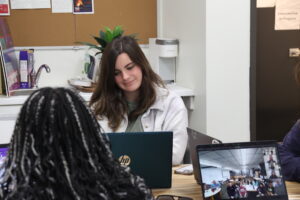January 16, 2024
Peer-to-Peer Zoom Conversation Reinforces Learning
There’s no better way for students to learn than to relish and share the experience with their peers. The actors and crew of KO’s fall production of The Grown Ups did just that when they Zoomed with the show’s cast from Wakefield High School in Massachusetts, who will perform the play in March. After learning that KO successfully performed the work on November 9th and 10th, the Wakefield director connected with Kyle Reynolds to see if his cast could pick the brains of the KO students to understand the characters’ motivation, the staging, the pitfalls, and the musical choices. The hour-long Zoom provoked plenty of conversation and laughs, a dynamic exchange between two sets of students deeply invested in learning.
“Talk about kids being excited about learning!” Reynolds said. “I’m so proud of them. They were so willing to offer advice, actively listen, and remain curious about how someone else’s interpretation of the text might be just as valid as theirs.”
The most impressive thing about the Zoom was that the two directors stayed in the background, gently guiding the conversion while the students remained center stage. The Westfield students asked about the relationship between two characters, Lucas and Maeve, and another questioned how the newest counselor, Cassie, overcame or embraced the difficulty of being an outsider.
Leo Kollen, who performed the role of Lucas, took the first question and shared he thought his character despised Maeve and felt she was too attached to him. He delineated scenes in the play depicting his feelings. One student from Wakefield asked Anissa Lewis, ’24, who portrays Cassie, how Lewis tried to fit in with the group as the new counselor at the camp and if she overcame or embraced the difficulty of that role. Lewis explained how her body language changed throughout the play, initially being rigid and closed off and becoming more outspoken and relaxed. “I sat with those uncomfortable moments,” she said. “I let my personality shine through. It’s a tough character. Cassie is the make-or-break of the show.”
Wakefield asked about the types of routines the cast established to get into character. Admittedly, the KO cast said the process involved considerable memorization for the first month in Mr. Reynolds’s office table reading until their delivery was conversational. “We spent most of our time rehearsing in that room,” Miles Gruber ‘26, said. Finally, after we had it all memorized- it wasn’t perfect- we could move into the space we eventually used. We didn’t even see the set until we had everything memorized.”
Teague Shamleffer fielded the question about his role as the assistant director in the play. Shamleffer shared that initially, he was the AD, which morphed into the role of prop director, creating multiple spreadsheets of props and outfits. He said serious thought and conversation went into selecting a prop, denoting them as a symbol for various characters. “As we moved into the theater and started blocking, there was a lot of conversation about “Does this make sense?” he said. He also stressed the importance of music and sound effects to portray drama or foreshadowing.
In a lighthearted back and forth, the two casts shared the pitfalls of using a drone on stage, a particularly eerie play segment when the outside threat intrudes on the camp idyll. Reynolds shared that in rehearsal, our drone broke, so he suggested that Wakefield order extra propellors. The Wakefield director laughed, “We’ve already gone through one. I put the batteries in backward. It’s not even a good story.”
The two groups shared the importance of the scenery and how to portray the destabilizing mood of impending threat. KO’s set design was particularly effective, and the KO team gave Wakefield great tips.
